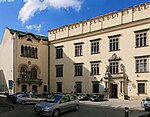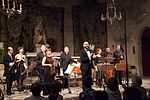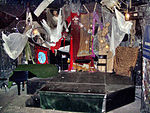Pontifical University of John Paul II

The Pontifical University of John Paul II (Polish: Uniwersytet Papieski Jana Pawła II w Krakowie) is an academic institution located in Kraków, Poland, that offers graduate degrees in theology, philosophy, and church history. It derived from the theology faculty of Jagiellonian University established in 1397. The theology faculty was expelled from the university by Communist authorities in 1954. Remaining under the supervision of the Vatican, the faculty received the honorific title of "Pontifical" in 1974 and was established as an Academy of Theology by Pope John Paul II in 1981 before becoming the Pontifical University of John Paul II in 2009.
Excerpt from the Wikipedia article Pontifical University of John Paul II (License: CC BY-SA 3.0, Authors, Images).Pontifical University of John Paul II
Józefa Dietla, Krakow Stare Miasto (Old Town)
Geographical coordinates (GPS) Address Nearby Places Show on map
Geographical coordinates (GPS)
| Latitude | Longitude |
|---|---|
| N 50.059444444444 ° | E 19.934722222222 ° |
Address
Historyczne centrum Krakowa
Józefa Dietla
31-073 Krakow, Stare Miasto (Old Town)
Lesser Poland Voivodeship, Poland
Open on Google Maps










